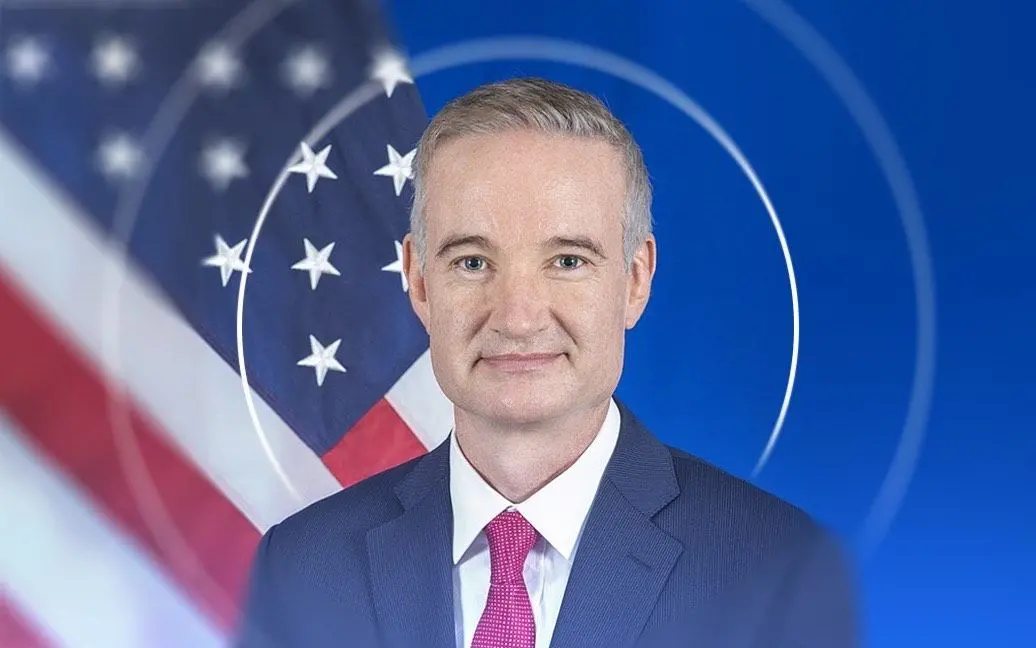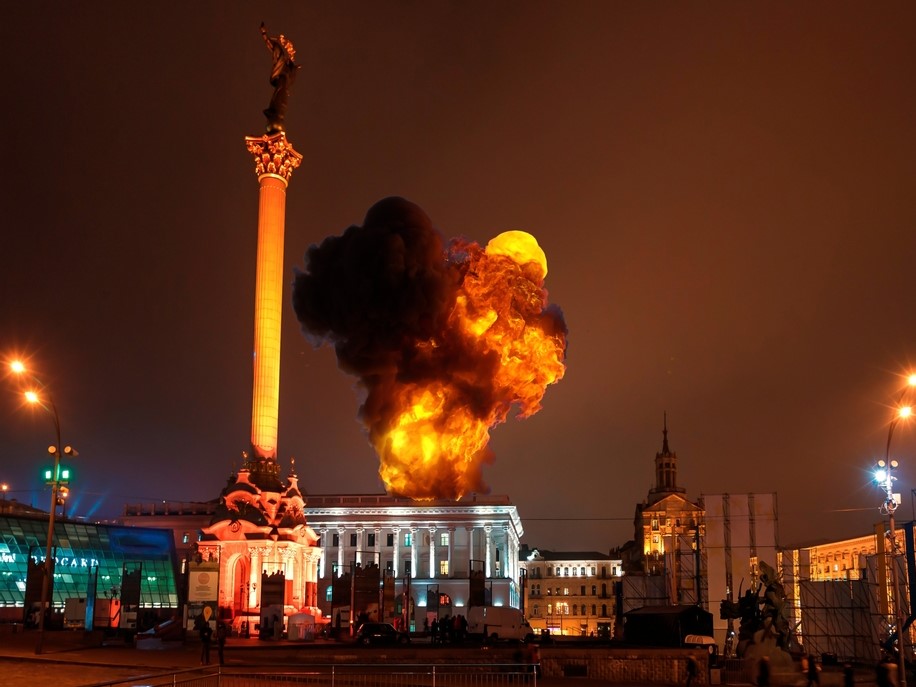
Amid reports from British intelligence that Russian forces didn’t advance in the past few days and risk to lose momentum after the occupation of Lysychansk, progress has been made in Istanbul with Russia on the export of Ukrainian grain, according to the reports from Kyiv.
However, we can talk about successful agreements when the Ukrainian grain reaches its final destinations, and Russia doesn’t attack the ships that will transport it, or even more, the Ukrainian ports.
But does it mean that Russia is ready to negotiate an end this war? And are any agreements with Russia even possible? It seems that the West has finally understood that Putin's Russia understands only force. That’s why the West decided to arm Ukraine for Russia to lose this war.
But if Putin still goes to the announcement of full mobilization? Or if he decides to use tactical nuclear weapons? TSN.ua discussed all these issues with the U.S. ambassador to the OSCE, Michael Carpenter.
This interview was made within the cooperation with The Pulitzer Center on the project "NATO after Putin’s war: a chance for a new breath or the beginning of 'death.'"

As a nonprofit journalism organization, we depend on your support to fund coverage of global conflicts. Help us continue funding the hard costs of in-depth coverage of the Ukraine invasion—including travel, hostile environment safety training, and the increased security expenses that arise from reporting in war zones.
- I want to start our interview with the very upset decision about the Russian veto on the OSCE projects in Ukraine. So that’s all? OSCE won’t be presented in Ukraine anymore?
- Well, not entirely. Of course, it’s unfortunate that Russia vetoed work of the mission in Ukraine. They vetoed both: the border observation mission, SMM and the Project Co-ordinator Office. But I think the participating states and the OSCE are fed up with Russia’s ability to veto everything. Because it is acting completely outside the bounds of human decency in terms of this ongoing war. So we are looking at it now. Long story, long answer to your short question is how to get the OSCE back into Ukraine active, working on all the issues they worked on before, but without Russia’s ability to veto? I think we found the way. I think you’ll see it in the coming weeks, but probably not more than a month, that there will be an OSCE presence reestablished. Well, actually currently there is a small presence in Kyiv. But it’ll be reestablished in a larger-scale going forward.
- So, are we talking about a new Office?
- We are talking about what used to be called the OSCE Project Co-ordinator in Ukraine. It’s likely to be also called the OSCE Project Co-ordinator in Ukraine going forward. But they will operate as a result of the contributions of likeminded states. So we won’t require any money from the Russian Federation and it will no longer have a right to use a veto either.
- But in general, is it possible to exclude Russia from the OSCE? How to do it?
- Well, look, if it were possible to suspend Russia from the OSCE I think you’d find a large number of participating states, maybe almost everyone, who is willing to do it. The problem is that there is no procedure. The OSCE is not an organization where you have to qualify for membership. It includes everybody in the Eurasian space from Vancouver to Vladivostok, as we often say. And so there is no provision for suspending or expelling the member. There was one that was used very little known provision that was used to suspend Yugoslavia in the 1990s. But that requires consensus minus one. Unfortunately, in the case of Russian-Belarus acting together as co-aggressors that procedure is not possible. But here is a thing that I’d like your viewers to know. We are using the OSCE every day and every week to hold Russia accountable for its brutality and war crimes. We’ve isolated Russia here at the OSCE and we will continue to do that even if we can’t expel them from the Organization.
- When we are talking more broadly, don’t you think that neither the UN nor the OSCE have failed in their main task, which is the prevention of wars?
- Well, the OSCE is the platform for dialog where the participating states get together at the round table and agree on whereas actions, decisions, declarations and advance their shared interests. When there is one participating state that so brutally violates the norms of the OSCE, meaning the Helsinki Final Act in this case, there is little the Organization could do to stop that state. Because it’s not a military organization, it is not like NATO, it doesn’t have forces or equipment in its disposal. It has field missions on the ground. But those field missions are limited in terms of what they can do. And we saw that clearly in Ukraine. The SMM which is very valuable during the time that it was existed was an unarmed mission and faced with tens of thousands of Russian soldiers and tanks. It was unable to do anything. And in terms of its own safety it had to be evacuated.
- How from your point of view the UN, OSCE and NATO will look like after Putin’s full-scale war against Ukraine?
- The OSCE right now is in an inflection point. It will have to see what happens at the end of this war or whether the OSCE revitalizes itself and finds an ability to actually contribute to cooperative security. Because right now there is not a lot of cooperative security taking place in Europe or in Eurasia. As far as NATO is concerned however, NATO has certainly found its way, is strengthening itself, is in fact adding two new members—Finland and Sweden—and has adopted a new Strategic Concept that labels Russia a direct threat to NATO. And so NATO is in fact much stronger now as a result of this war and will likely continue to be stronger for the foreseeable future. Which is one of the inevitable consequences for Vladimir Putin. But look, the entire international system has been shocked by this war. And so right now we are having to find new ways of doing business to either scourge Russia, or to isolate Russia, or to find ways that we can accomplish things without Russia.
- Do you personally believe in Ukraine’s victory right now?
- Yes, absolutely. I completely believe in Ukraine’s ultimate victory. It may take a lot of time coming. But I’m convinced that Ukraine first of all has right on its side, Ukrainians are defending their homes, their neighborhoods and their cities. And so they are doing what is right and honorable. And what the Russian Federation is doing is barbaric. As I’ve said before it’s outside the bounds of human decency. They are executing civilians point blank, at least according to the reports from Bucha and other places where this horrific evidences are. And they are conducting themselves unlike a military force that is befitting of that title and certainly outside the bounds of the Geneva conventions. So at the end of the day I’m convinced Ukraine will emerge a victorious. And the U.S. as President Biden has said is prepared to help Ukraine for as long as it takes.
- But what does it depend on? And will this war be long-lasting in your opinion?
- I can’t predict because I don’t know frankly how long the war will last. What I do know is that the U.S. alone has given Ukraine $6.9 billion in military assistance since the outbreak of this war. We are prepared to do more as I just said. And Ukrainians are determined to defend themselves as you know. And we are determined to provide them with the equipment necessary. And President Biden has said that we’re not going to get directly involved with the American troops on the ground because we don’t want to have the World War III. But we’ll give Ukraine the capabilities necessary for defending its territory against this aggression.
- But what is your prognosis, how can this war theater look like in the nearest future?
- You know, it’s a matter of few things. On the one hand, it’s a matter of Russia’s ability to replenish its war machine. In other words, to make its military industrial complex going forward. And the sanctions and the export controls are severely undercutting Russia’s ability to do that. And so that is one factor. The other factor is the provision by Western countries to Ukraine of advanced military equipment, like for example the HIMARS system, which is a high mobility artillery system. It is very precisive, very effective in targeting enemy forces. And so if we, the U.S. and the Western allies can galvanize that support for Ukraine going forward, then Ukraine certainly stands a chance, as Russia’s resources are diminished over time, to expel Russia from its territory.
- Is there a risk that Putin can announce a full-scale mobilization in Russia?
- Certainly he could. That’s an option that’s available to Vladimir Putin. But I think he would be intensely unpopular in Russia if he did. There is a reason why the Kremlin hasn’t done it so far. They couldn’t have done it back in February, or in March, or April, or May. They haven’t done it because I think they know they would be widely unpopular in Russia. But of course it is a possibility. But look, we know from the reports we are getting that Russian troops have extremely low morale. Their units don’t have good cohesion. They are unwilling often to fight. And so right now, frankly, the Russian forces are scraping the bottom of the barrel to be able to sustain this fight at the tempo at phase that they are currently.
- Is there a risk of spreading this war outside Ukraine? We see how Russia threatens the whole of Europe because of the Kaliningrad issue. The Kremlin even talks about the possibility of using nuclear weapons. Have you discussed this issue in the OSCE, for example?
- Well, we do discuss the threats that Russia has deployed against certain countries and the threats that Russia poses to the entire European community of countries including many of those who are the members of the OSCE. And just not in Europe by the way but in Central Asia and beyond as well. So there is an acute sense of threat. As I’ve mentioned, NATO’s Strategic Concept labels Russia as a direct threat. This is new. And so, yes, we take this very seriously. That’s why the EU is increasing its capabilities, that’s why the U.S. is putting a permanent army base into Poland. Also we are putting additional rotational brigade combat teams in Eastern Europe, additional fighter squadrons and a lot more besides that to strengthen deterrence and defense capabilities on the Eastern flank of the Alliance.
- Do you believe that this Russian full-scale war against Ukraine can end at the negotiation table?
- Most worst do that at the negotiation table. Typically, unless there is an advantage by one side of the other side. Typically, conflicts are resolved through some sort of political resolution. Secretary Blinken, President Biden and others have said that the U.S. is going to support Ukraine and we are going to follow Ukraine’s lead on this. It is for Ukraine’s leadership to determine what sort of political resolution they are willing to accept. And we will support Ukraine’s lead on this. We’ll give them what is necessary to defend their territory. And if it comes to the negotiation, and right now I understand the time is not right for negotiation, but when that time comes we’ll certainly be willing to support Ukraine fully.
- Can for example the OSCE or the UN be the side at this negotiation table? Can the UN or OSCE peacekeeping mission for example guarantee a ceasefire security to Ukraine?
- The OSCE has very limited experience in deploying peacekeeping missions. The OSCE has deployed observation missions along various international borders. It has deployed monitory missions. Typically, those are unarmed. The UN of course has deployed armed peacekeeping operations in the past. So that could be a possibility. But you know I’m getting ahead of myself because it’s uncertain at this point of time. If there is a negotiation resolution what it will look like? So we are tending focus right now at this particular point time on giving Ukraine especially the capabilities that it needs including medium-range air defense which the U.S. is giving just in the last I’d say weeks, the HIMARS system and long-range artillery. That is what is necessary right now for Ukraine to have an advantage going into any negotiation. And that we are focused on for now.
- Is there a risk that Russia can use its nuclear weapons? And what scenario do you see for the end of this war?
- To say broadly in the nuclear domain the Russian leadership has engaged in over the last couple months it is deeply irresponsible. There is a taboo in the international system against the use of nuclear weapons for a very good and obvious reason. Namely no one can ever win the nuclear war. In fact, the P5 countries which includes Russia and China just a few months ago issued a statement with the fact that no nuclear war can ever be won. And so this turn of rhetoric is destabilizing and irresponsible. But look, I think we have to be prepared for all eventualities. I think we have to ensure that if it came to such an event which is inconceivable perhaps for some that it’d be met with the most severe consequences. But meantime this is a conventional war that is taking place in Ukraine. And again: we want Ukraine to win. And we are going to do what it takes for Ukraine to win this war.







